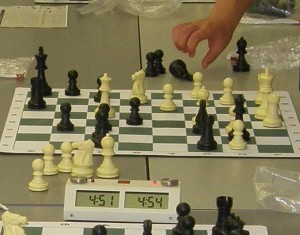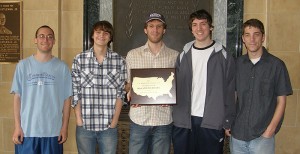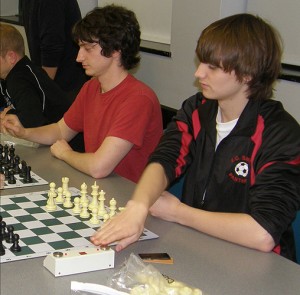
After the UConn football team made headlines in January for playing in its first-ever Bowl Championship Series game at the Fiesta Bowl and before the men’s basketball team returned from the Final Four with its third NCAA championship in April, a less heralded UConn team more quietly celebrated its own title.
In late February, the Chess Club returned to Storrs with the first place trophy from the college section of the 2011 World Amateur Team East and U.S. Team East Tournament, which took place in Parsippany, N.J. The five-member team competed against 30 other colleges among 200 teams that included more than 1,000 chess players.
“UConn had sent several teams in the past, but they never won this section before,” UConn’s top player, senior Robert Hungaski told The Daily Campus when the team returned.
Hungaski, who will complete his studies in the College of Liberal Arts and Sciences in December with degrees in philosophy and political science, is among the top chess players in the nation, holding a ranking of International Master, the category just below a Grandmaster ranking.
“I’ve been playing competitive chess since I’ve been 12 years old and studying many hours a day,” Hungaski says of his passion for chess. “It’s taken a lot of work to get there. If you really love it you stick with it and things start to happen.“
Hungaski led the UConn team, which also included Matt Morra ’12 (ENG), Ryan Wantroba ’11 (CLAS), Miyim Sheroff ’11 (CLAS) and Alex Fikiet, a student at E.O. Smith High School enrolled in UConn’s Early College Experience program and who is No. 5 in the U.S. in the under-16 chess rankings and No. 231 in the world in the under-18 rankings.
Tom Hartmayer, a self-employed landscape nurseryman who attended UConn works with the Chess Club organizing tournaments and assisting with club meetings, and club advisor John Fikiet, instrumentation and computer engineer in the electronics shop of the School of Engineering, both say interest in chess on campus is growing. There are 45 members in the club, including 27 UConn students. Some college chess clubs include members from the local community, they say.

“We have seen in last two years an uptick in student interest,” says Hartmayer, who was a Chess Club member as an undergraduate. “After the team was written up in The Daily Campus, a couple of new faces showed up the next meeting. It also helps that you’ve got someone like Robert Hungaski living in your dorm and a couple of kids came to realize he’s a world class player and speaks a couple of languages. He’s been one of the hottest players in the last two years.”
Fikiet has been expanding interest in the Chess Club, whose members include students representing a cross-section of academic majors, through activities beyond the group’s tournaments and regular meetings.
In April he invited world renowned Grandmaster William Lombardy to Storrs to talk about chess. Lombardy, the first American to win the World Junior Chess Championship, went on to coach Bobby Fischer before in his 1972 World Championship match against Boris Spassky, a focal point of the documentary film, “Bobby Fischer Against the World,” which is now airing on HBO.
“It was so enlightening because of the level of the play and the stories he told about the chess world,” Fikiet says. “He gave up chess to become a priest. He now lives in New York City and my son Alex is taking lessons from him.”

With support from the School of Engineering, the Chess Club has also started working with school children attending the Goodwin Elementary School in Mansfield, teaching the youngsters how to play chess.
“Working with kids is the best,” Hungaski says, “You learn how to approach them in a way that they understand what you’re trying to communicate. We were able to get through to these kids. It might seem obvious, but learning how to properly engage the people that are trying to learn from you transcends chess. It applies to all disciplines. Chess just happens to be a great way to do it.”
Fikiet says the Chess Club hopes to expand its competition against other colleges and universities in the region. Last year the club participated in tournaments held at Williams College and Boston College. The club expects to compete in the Brown University Open in February 2012. The club’s ability to begin competing beyond the northeast region will depend on its ability to obtain funding for travel expenses, he says.
For more information on the Chess Club: http://www.uconnchess.uconn.edu


